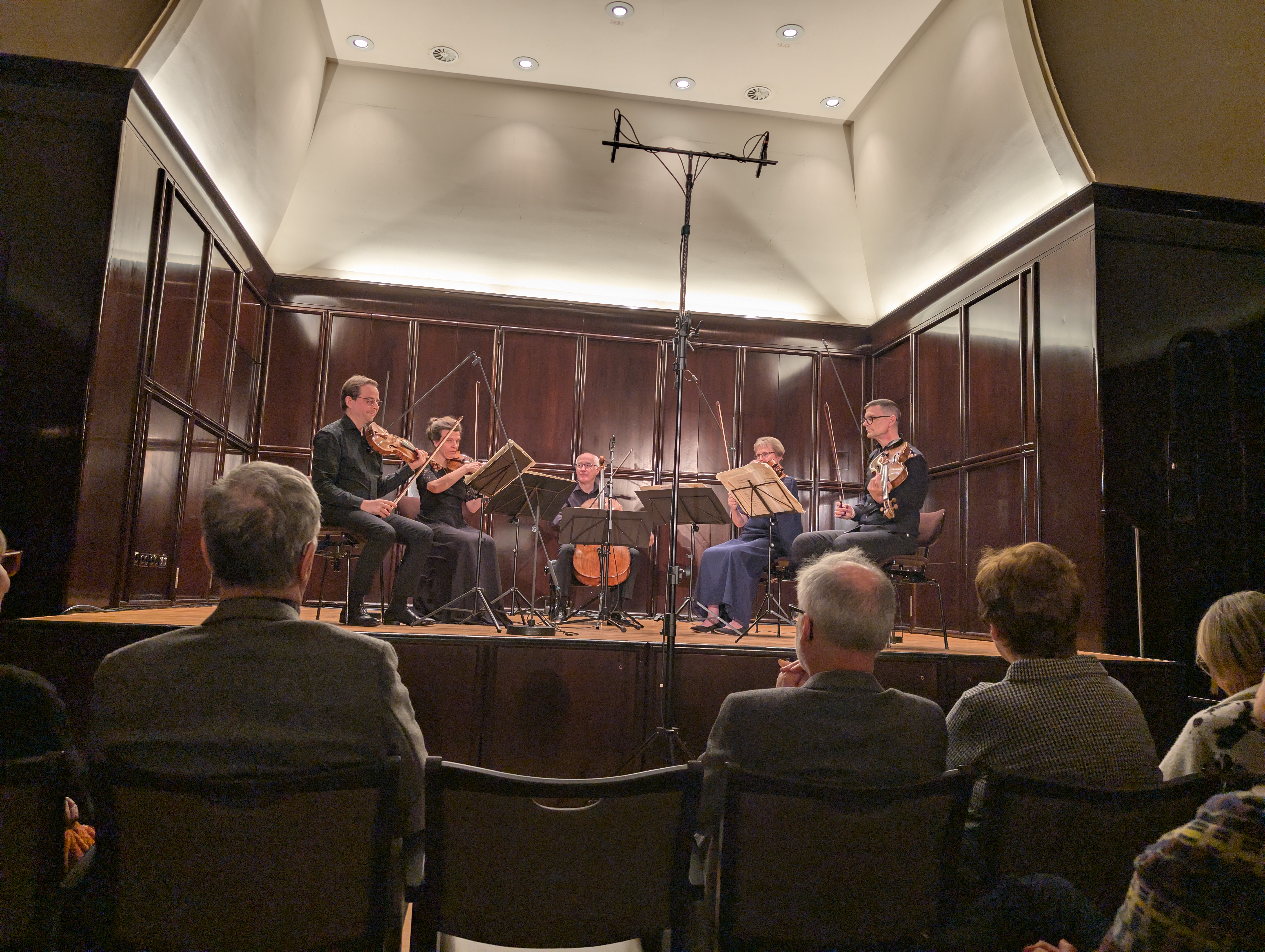Bartholdy Quintett in Bremen
Bis zum gestrigen Abend war meine einzige Beziehung zu Kammermusik der Fakt (den ich vielleicht auch falsch attribuiere, wie zumindest eine kurze Google-Suche nahelegt) dass Dumbledore klassische Musik mag, und mit dem Alter immer mehr zu Kammermusik tendierte. Nach dem ersten Besuch meinerseits eines Klassikkonzertes einerseits und des kleinen Saals in der Glocke andererseits kann ich bestätigen, dass Dumbledore damit dem Trend entspricht. Schon Glockenkonzerte an sich sind ja eine sehr biedere und ältere Angelegenheit, Kammermusik treibt das aber noch auf die Spitze. Bisher hab ich es auf jeden Fall noch nie geschafft, dass selbst der Kartenkontrolleur über mein legeres Outfit (dabei trug ich sogar Hemd!) empört war, und meine verspätete Begleitung wurde erst beim ersten Beifall eingelassen (was ich verständlich finde, aber mir auch noch nie passiert ist).
Kammermusik ist ja das Klassikpendant zur Rockband, in dem es nur wenige (4–6) Instrumente sind, die hier eingesetzt werden. Insofern hört man von den einzelnen Instrumenten mehr als bei Orchestermusik (ausgenommen natürlich Konzerte, wo das Soloinstrument ja auch sehr im Vordergrund steht), gleichzeitig gibt es aber immer noch das Zusammenspiel der Instrumente (im Gegensatz zu Stücken für Einzelinstrumente). Ich denke, was diese Musikform besonders anfällig fürs Anziehen von älteren Menschen und dem Verscheuchen von jungen macht ist, dass sie genauso auf die moderne Songstruktur scheißt, die innerhalb von 2–6 Minuten zu ihrer Auflösung kommt wie Orchestermusik, man sich also einfach lang auf ein Thema und das Spielen damit einlassen muss, um wirklich in der Musik versinken zu können, dass ihr aber andererseits die Grandesse eines Raums voller Instrumente fehlt.
Stören tut die ganzen Alten natürlich nicht, jedoch merkte man schon deutlich eine gewisse Distanziertheit ob des Nichteinhaltens gewisser Kleidungsregeln, sowie eine sehr strikte Einhaltung der Applausregeln (zweimal wieder auf die Bühne kommen nach einem Stück, viermal am Ende, danach gab es Zugabe).

Schön, weil treibend (vorwiegend im letzten Satz) fand ich das Stück von Zemlinsky (mit Humor!), den letzten Satz von Mozart, und das Brucknerstück, dass mir durch einen sehr energischen Part am Ende des zweiten Satzes sowie das fast natürliche Erwachsen eines Violinthemas aus dem vorherigen auffiel. Muss ich mir noch einmal anhören. Von den Musikern erschien mir der Kontrabassist am sympathischsten, weil er der Lockerste war, gespielt haben sie alle wunderbar.
Gut fand ich auch die alte Dame neben mir, die mich wegen meiner Peanuts-Hose ansprach, und meinte, dass die eine farblich (lila) zu ihrem Pullover passende Hose hätte, aber sich nicht getraut hätte, sie anzuziehen. Ich hätte mich gerne mehr mit ihr unterhalten, aber nach dem Konzert war sie schnell weg.
Until yesterday evening, my only connection to chamber music was the fact (which I may have attributed incorrectly, as at least a quick Google search suggests) that Dumbledore likes classical music and tended increasingly towards chamber music with age. After my first visit to a classical concert on the one hand and the small hall in the Glocke on the other, I can confirm that Dumbledore is following the trend. Even Glocke concerts are a very staid and elderly affair, but chamber music takes it to the extreme. So far, I have never managed to shock even the ticket inspector with my casual outfit (I even wore a shirt!), and my late companion was only let in during the first round of applause (which I find understandable, but it has never happened to me either).
Chamber music is the classical counterpart to a rock band, insofar as only a few (4–6) instruments are used. In this respect, you hear more of the individual instruments than in orchestral music (except, of course, in concerts, where the solo instrument is also very much in the foreground), but at the same time there is still the interplay of the instruments (in contrast to pieces for single instruments). I think what makes this music form particularly susceptible to attracting older people and scaring away young people is that it equally shits on the modern song structure, which comes to its resolution within 2–6 minutes, like orchestral music, so you just have to get involved with a theme and play with it for a long time to really be able to immerse yourself in the music, but on the other hand it lacks the grandeur of a room full of instruments.
Of course, the old ones in themselves don’t bother, but you could clearly feel a certain distance due to the non-compliance with certain clothing rules, as well as a very strict adherence to the applause rules (coming back on stage twice after a piece, four times at the end, after which there was an encore).

I liked the piece by Zemlinsky (with humour!) because it was driving (especially in the last movement), the last movement by Mozart, and the piece by Bruckner, which caught my attention with a very energetic part at the end of the second movement and the almost natural emergence of a violin theme from the previous one. I have to listen to it again. Of the musicians, the cellist seemed the most likeable to me because he was the most relaxed. They all played wonderfully.
I also liked the old lady next to me, who commented on my Peanuts trousers and said that she had a purple jumper that matched them, but didn’t dare to wear them. I would have liked to have had a longer chat with her, but she was gone quickly after the concert.